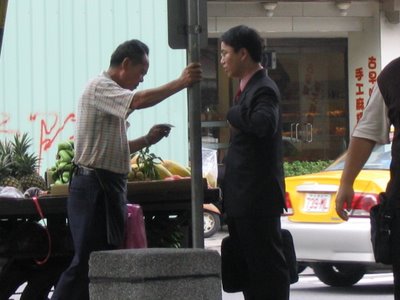The first female president
Within the next year, Taiwan's president, Chen Shui-bian, could step down--or, a lesser possibility, he could be recalled. It might happen tomorrow or next month or it might not happen at all. Much still has to play out in this politi-drama, the sequel to Clinton 1998.
Since last week, several opposition leaders have been calling for Chen to give up his position, or face a recall, because his son-in-law was recently arrested for an insider trading scandal. In fact, even though Chen hasn't been implicated in anything, scandal is the word of the day. You can read a simple run-down here (You can also listen to the longer piece by Caroline Gluck, who freelances for RTI and BBC. Just click next to the "Listen Now" sign on the top right of the RTI webpage. It's the 4th story).
The calls for Chen to step down will only grow louder. Some people are calling it a witch hunt.
As things stand, if no new variables enter the equation, Ma Ying-jeou, the mayor of Taipei and the head of the opposition KMT (formerly the only party in Taiwan), will likely win the 2008 presidential election.
Ma, as I understand it, is also liked in Beijing--he has traveled there to meet with Chinese leaders. He recently also traveled to the states, while Chen, Taiwan's democratically elected president, was refused entry.
If a recall of the president is indeed successfull, it would have damaging consequences for his Democratic Progressive Party (DPP) and almost certainly assure KMT control of the island.
However, and I say this as a fairly unbiased observer, if Chen can find the opportune moment to step down (I don't know if he would do that), it would be a historic moment, and in my view the best possibility for his party.
Vice President, Annette Lu, would become president (I'm not sure what would happen in the event of a recall, but it would draw out for a long time). She would be the first woman president in Taiwan's history. You can read this Time interview with her from April 2000, when she and Chen first came to power, here. Just to stoke your curiosity, the sub-heading of the interview reads: "Meet the woman Beijing recently labeled the 'scum of the nation.'" Caroline Gluck recently interviewed her as well.
We'll just have to wait and see what happens. Things could start to get very interesting here.









